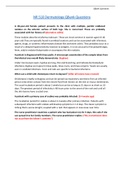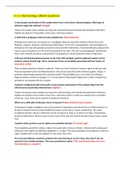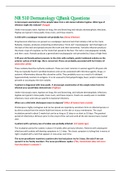Nr 510 dermatolog - Study guides, Class notes & Summaries
Looking for the best study guides, study notes and summaries about Nr 510 dermatolog? On this page you'll find 8 study documents about Nr 510 dermatolog.
All 8 results
Sort by
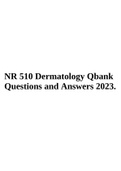
-
NR 510 Dermatology Qbank Questions and Answers 2023.
- Exam (elaborations) • 18 pages • 2023
-
- $11.99
- + learn more
NR 510 Dermatology Qbank Questions and Answers 2023. A microscopic examination of the sample taken from a skin lesion indicates hyphae. What type of infection might this indicate? (Fungal) Under microscopic exam, hyphae are long, thin and branching and indicate dermatophytic infections. Hyphae are typical in tinea pedis, tinea cruris, and tinea corporis. A child with a sandpaper-textured rash probably has: (Strep infection) Streptococcal infections can present as a sandpaper-textured rash ...
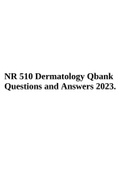
-
NR 510 Dermatology Qbank Questions and Answers 2023.
- Exam (elaborations) • 18 pages • 2023
-
- $12.49
- + learn more
NR 510 Dermatology Qbank Questions and Answers 2023. A microscopic examination of the sample taken from a skin lesion indicates hyphae. What type of infection might this indicate? (Fungal) Under microscopic exam, hyphae are long, thin and branching and indicate dermatophytic infections. Hyphae are typical in tinea pedis, tinea cruris, and tinea corporis. A child with a sandpaper-textured rash probably has: (Strep infection) Streptococcal infections can present as a sandpaper-textured rash ...
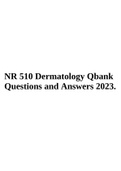
-
NR 510 Dermatology Qbank Questions and Answers With Explanations 2023.
- Exam (elaborations) • 18 pages • 2023
-
- $12.49
- + learn more
NR 510 Dermatology Qbank Questions and Answers With Explanations 2023. A microscopic examination of the sample taken from a skin lesion indicates hyphae. What type of infection might this indicate? (Fungal) Under microscopic exam, hyphae are long, thin and branching and indicate dermatophytic infections. Hyphae are typical in tinea pedis, tinea cruris, and tinea corporis. A child with a sandpaper-textured rash probably has: (Strep infection) Streptococcal infections can present as a sandpa...
NR 510 Dermatology QBank Questions NR 510 Dermatology QBank Questions NR 510 Dermatology QBank Questions
NR 510 Dermatology QBank Questions
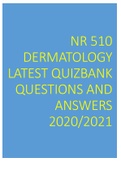
-
NR 510 DERMATOLOGY LATEST QUIZBANK QUESTIONS AND ANSWERS 2020/2021
- Exam (elaborations) • 19 pages • 2021
-
- $14.49
- + learn more
A microscopic examination of the sample taken from a skin lesion indicates hyphae. What type of infection might this indicate? (Fungal) Under microscopic exam, hyphae are long, thin and branching and indicate dermatophytic infections. Hyphae are typical in tinea pedis, tinea cruris, and tinea corporis. A child with a sandpaper-textured rash probably has: (Strep infection) Streptococcal infections can present as a sandpaper-textured rash that initially is felt on the trunk. Rubeola, measles, p...
NR 510 Dermatology QuizBank Questions/Answers (100%)

Study stress? For sellers on Stuvia, these are actually golden times. KA-CHING! Earn from your study resources too and start uploading now. Discover all about earning on Stuvia

